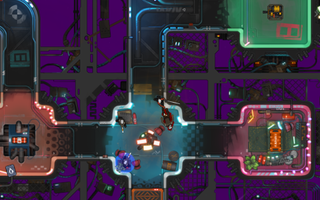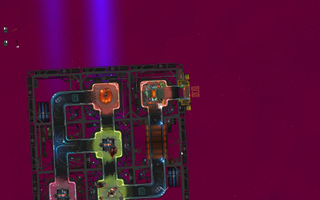We found out how badly interstellar hijacking can go in Heat Signature
Cause and effect can spin wildly out of control.
Understanding the complex web of interactions in Heat Signature is a feat that even its designer and former PC Gamer editor, Tom Francis, struggles with. He and I are huddled over his laptop, scouring the screen like a pair of detectives looking for clues to try and piece together how a supposedly silent assassination ended with a gunshot wound to the stomach and a pair of guards rushing in to investigate the commotion. More than the deadly guards Tom and I are trying to sneak past, the butterfly effect—the idea that a miniscule action can trigger a chain of ever-bigger consequences—is the real villain of the game.
Like Spelunky, Heat Signature is far more obsessed with the how than the why. Playing like a procedurally-generated Hotline Miami, you infiltrate enemy spaceships and fight your way past groups of guards in order to complete various objectives. One mission was a simple assassination where I needed to also collect my target's body and bring it back to base, while another required rescuing a prisoner. Heat Signature's missions are simple in their premise, but that simplicity cleverly disguises a complicated web of systems that pulls inspiration across genres of games from Dishonored 2 to FTL.
Seeing Francis' own game get the better of him makes Heat Signature feel unpredictable and dangerous. If its creator can't even predict what will go wrong, what hope do I have?
During the first part of the demo, Francis manned the controls to walk me through the basics but ended up showcasing how unwieldy a beast Heat Signature can be. When he tried to use a hammer to kill a guard, he knocked him against a wall which caused his gun to accidentally discharge. That unexpected shot alerted other nearby guards who immediately rushed into the room. And just like that, Francis' cool and calm walkthrough went belly-up on him. Seeing Francis' own game get the better of him makes Heat Signature feel unpredictable and dangerous. If its creator can't even predict what will go wrong, what hope do I have?
Fortunately, Heat Signature has a pause button—and thank God for that. Unlike Hotline Miami, where death is followed by an instant restart, catching a bullet in Heat Signature has much bigger consequences. Whenever you die, you have to start over from scratch as a brand new character with starter equipment. There are no second chances. But being able to pause affords you the opportunity to always plan your next step.

As the two guards entered the room, Francis used a stealth projector to emit a cone of 'anti-visibility' and conceal his position. As long as he kept it pointed at the guards, they couldn't see him, allowing him to slip away. Gadgets play a massive role in Heat Signature, and there's an exciting array of tools at your disposal, many with randomized properties. Guns might have silencers or fully-automatic firing modes, but those are the more standard of the fair. Subverters can disable electronic devices or make them work in your favor. Special 'swapping teleporters' let you switch places with other characters while 'visiting teleporters' will pull you back to your original place after a second or two.
Learning how to use these tools effectively is what will be the difference between a player stuck taking on easy missions and those capable of going for Heat Signature's most brutal encounters. But as Francis tells me, Heat Signature is a game that shines when in the hands of players who take the interesting route over the easy route.
During my assassination mission, I had managed to work my way room-by-room to where my target was. Things were going pretty well except for one close call when I stealth killed a guard and the sound of his body hitting the floor alerted the other guard next to him (yes, apparently that's a thing).
PC Gamer Newsletter
Sign up to get the best content of the week, and great gaming deals, as picked by the editors.
My target was in the room next to me with another guard. Realistically, I could've just lobbed a grenade in there and ended the mission without much fanfare. But where's the fun in that? Instead, I decided that the coolest way to kill my mark would be to eject him out into the vacuum of space where I could then collect his frozen corpse. To do that, I would need to draw him into the room I was currently in and shoot out the glass window.
Again, I could've just fired my gun and alerted both characters to the noise, but I decided to step things up a notch. Using my swapping teleporter, I switched places with my mark and shot his bodyguard. Before my target could figure out why he was suddenly in a different room, I rushed back in and shot the window and sucked us both out to space.

Fortunately for me, Heat Signature allows you to remotely control your spaceship for just these moments. As my oxygen began to run low, I undocked my ship and piloted it over to my location to scoop me and my kill up—only there was a problem. Our target, now flying through vacuum at hundreds of kilometers an hour, wasn't dead and therefor I was unable to scoop them up. With a grim face, Francis informed me that I'd have to find a way to kill him.
Seeing another opportunity to up the stakes on this mission, I figured the best way to do that would be to leave my ship and shoot him. But lining up a shot between two entities moving hundreds of kilometers through space isn't as easy as it seems. Eventually, I puzzled out the best way to do this would be to eject myself from the ship so that I was ahead of my target, negating the need to lead my shot.
There's very little about Heat Signature that feels human. Yet its layers of interlocking systems are adept at creating little vignettes of story as you breach and murder.
When I finally blasted him, his body immediately disappeared. For a moment both Francis and I were confused until I reboarded my spaceship and found his corpse on the floor. The impact of my shotgun had propelled him backwards into my ship—saving me the step of having to collect him—something that Francis didn't even realize was possible. What was supposed to be an easy mission turned into a space-walking assassination that surprised even the creator of the game.
With so many gadgets at my disposal, Heat Signature feels adept at making these kind of moments commonplace. Since just about everything is procedurally generated—from the characters you play to the spaceships you board—there's very little about Heat Signature that feels human. Yet its layers of interlocking systems are adept at creating little vignettes of story as you breach and murder. I imagine it will spawn many, many stories that start with, "This one time…"

It's unclear to me how these singular moments will tie into the larger game, however. Heat Signature doesn't have an overarching story. Instead, each character has a larger objective that they'll work toward over several missions. One woman I played as was looking for her drunken husband. That's not exactly what I'd call a grand mission. I'm concerned that, without a greater goal to work towards, Heat Signature will end up feeling like a cool idea that should be strapped to a larger game. In Spelunky, you're always working to beat that high score and dive deeper into the cave, but Heat Signature's open world sandbox doesn't inspire that same kind of obsessive motivation. It'll need something beyond what I saw to keep me coming back.
Still, of all the games I saw at last week's Game Developers Conference in San Francisco, Heat Signature is the one I can't shut up about. Francis isn't committing to a release date quite yet, and its obvious by the demo we played that there's plenty of work left to do. But like Spelunky, Heat Signature is quickly becoming the kind of game that draws stories out of raw complexity. If a space-walk murder is the story I came away with after just an hour of playing, I can't imagine what tales I'll tell when the full game releases.
Disclosure: Tom Francis used to work at PC Gamer, and we still publish his articles occasionally, but we don't think you should hold that against him.
With over 7 years of experience with in-depth feature reporting, Steven's mission is to chronicle the fascinating ways that games intersect our lives. Whether it's colossal in-game wars in an MMO, or long-haul truckers who turn to games to protect them from the loneliness of the open road, Steven tries to unearth PC gaming's greatest untold stories. His love of PC gaming started extremely early. Without money to spend, he spent an entire day watching the progress bar on a 25mb download of the Heroes of Might and Magic 2 demo that he then played for at least a hundred hours. It was a good demo.
Most Popular




